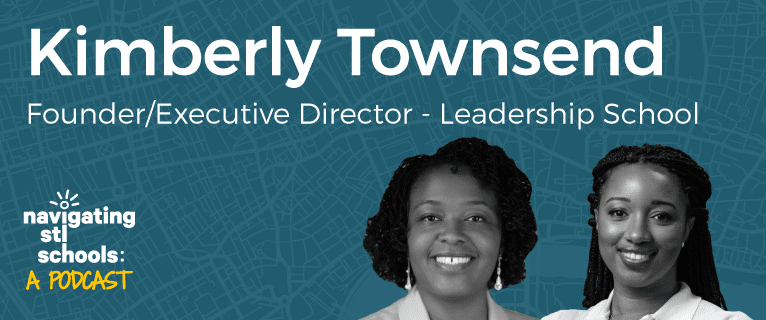Kimberly Townsend: Busting Charter School Myths
May 3, 2021

“I want to make sure that children who come into a school and I engage with, that they walk away having had an experience where they were valued, where they were known, seen and loved, where their opinions mattered, where they could contribute.”
Kimberly Townsend
Welcome to Navigating STL Schools, a podcast.
Today’s guest is Kimberly Townsend, founder and executive director at The Leadership School, a charter school in St. Louis. Kimberly has 15 years in the teaching field and sees charter schools as just a different approach to education. In this episode, Kimberly sits down with Staci to discuss the impact of teachers empowering their students, what parents need to know about charter schools, and how to determine what values they want for their child.
They discuss:
- Kimberly’s K-12 experience on the south side of Chicago
- Her first memories of school and learning was Mrs. Margaret Robinson’s fifth grade class
- Never saw herself as a smart kid before that
- Mrs. Robinson exposed her to so many new experiences
- Kimberly had the privilege of having Mrs. Robinson again for sixth grade
- Her first male teacher was Mr. Hardaway
- He introduced her to magnet schools, which changed the trajectory of her life
- Her first memories of school and learning was Mrs. Margaret Robinson’s fifth grade class
- She was a first generation college student
- The impact of teachers caring about not just teaching students but fostering and empowering
- Misconceptions about charter schools
- They are public schools
- They’re open to everyone in that community
- They are transparent, you can come to board meetings and ask question
- How the structure and accountability works
- We often hear charter schools aren’t accountable, they can do whatever they want
- Autonomy is for the program. We can think about the model, structure of the school day, school year, allocation of teachers and resources
- The what, the outcomes are the same as public schools.
- Students take same assessments, same financial reporting to the state departments of education
- Are politics part of the misconceptions about charter school?
- National politics play a role
- Part of the problem is education is not a federal mandate, it’s state and local
- How can charter schools make positive impacts on parents and students?
- They can offer a different model, different approach
- Parents are experts on their own children
- Charter schools can partner with parents, students, families
- How do you determine what values you want for your child?
- Watching my daughter in her interactions with others
- What kind of situation/setting do you think your child needs?
- Ask questions, and listen
- Any parent should be able to walk into a school and learn about where the school’s and teachers’ focus is
- Embracing the idea of a school where kids can be themselves
- There is structure and discipline
- Students are working towards goals, but goals they’ve set themselves
- What is one tool parents need to have for K-12?
- Information
- Know they have a right to ask questions that matter to them, they should be pushing
- What can Navigate STL Schools do to empower students?
- What you’re doing is exactly the right thing
- Help parents know what options exist, navigate the system
- Continue to support parents
- On the school side, share back, help schools understand what you’re hearing back from parents. Schools need to know that information. Here’s what parents care about, are asking about